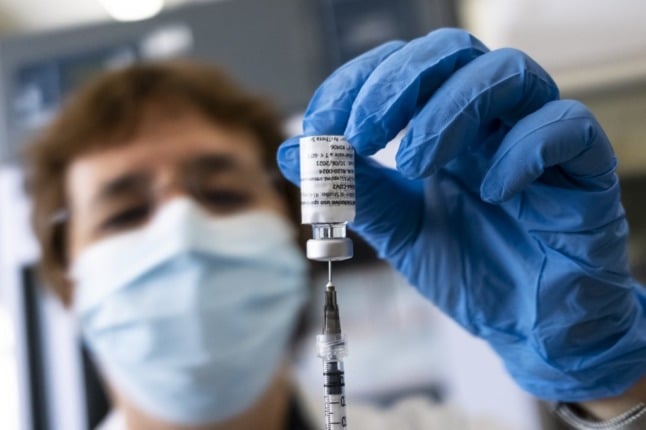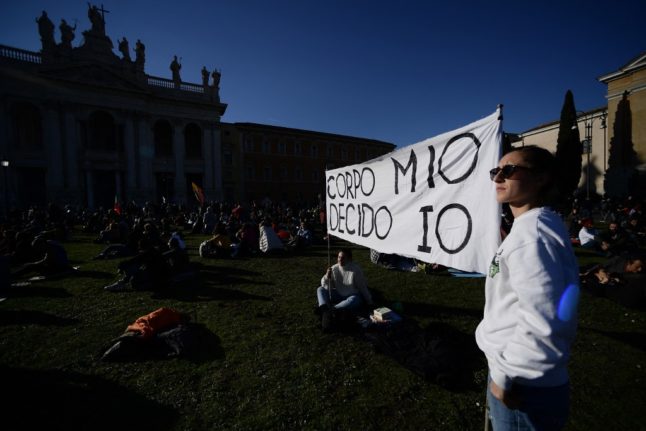Cases of coronavirus infection are still to be expected among those who are vaccinated, but the number amounts to much fewer than in the unvaccinated, Italy’s Higher Health Institute (ISS) reported in its latest update on vaccinations.
Published in its FAQ section in relation to Covid-19 cases among those who have been fully immunised, the ISS revealed that Covid-19 incidence among vaccinated people is 10 times lower.
“A comparison of cases tells us that the vaccine works,” stated the ISS.
READ ALSO: Over half of Italy is now fully vaccinated against Covid-19
The findings report a “paradoxical effect” when vaccinations reach a high level of coverage. It can develop to the point where the number of infections, hospitalisations and deaths become similar among both vaccinated and unvaccinated people.
However, when putting these numbers into a ratio format – the number of cases versus the population – the figure is much lower in the vaccinated group.
“These numbers, if read correctly, therefore reaffirm how effective vaccination is,” added the report.

As vaccine coverage increases, the number of cases decreases due to the effectiveness of the vaccination.
“This means that the few cases among those who are vaccinated may appear proportionately large,” added the ISS.
Over half of Italy’s population over 12 years old – almost 52 percent – have now been fully vaccinated, according to the latest government figures.
The ISS pointed out that it’s “therefore possible and expected” that there are still cases of infection, hospitalisations, admissions to intensive care even among vaccinated people.
However, they reiterate that “these are much lower than among unvaccinated people”.
They also refer to population groups with very high vaccination coverage, which would mean that most of the reported cases could therefore occur among vaccinated subjects, purely because the number of vaccinated people is much higher than that of those unvaccinated.
The findings come after the Italian government is looking into moves to encourage higher rates of vaccination and to curb infections, following a rise in coronavirus rates throughout the country.
This includes making immunisations mandatory for teachers and expanding its ‘green pass’ to access venues and events – granted to those fully vaccinated without further need for testing.
READ ALSO: What do Italians think of the extended Covid ‘green pass’ scheme?
Speaking about concerns and loss of confidence in the vaccines, the ISS noted that this reported paradox needs to be recognised.
The institute also noted that the number of people prevented from getting ill from coronavirus isn’t reported – only those who fall ill despite getting the vaccine is.
They argued that the vaccination is effective in protecting the population, although they concede that its efficacy is not 100 percent.
“We currently know that anti-Covid-19 vaccination, if the full vaccination cycle is carried out, protects 88 percent from infection, 94 percent from hospitalisation, 97 percent from admission to intensive care and 96 percent from a fatal outcome of the disease,” the report read.
However, the update also warned that if the virus circulates due to lack of vaccination coverage among the population or if restrictions are not adhered to, there is a greater risk of the virus being transmitted to people who are vulnerable to severe disease, even if vaccinated.
READ ALSO: How many people in Italy still aren’t vaccinated?
Moreover, this also creates a greater danger of new variants appearing, according to the ISS.
The Delta variant has been predicted to overtake the currently dominant Alpha variant in Italy, as the summer season unfolds and more gatherings take place.
And vaccinations alone aren’t enough, according to Andrea Crisanti, director of the department of microbiology at the University of Padua.
Speaking to Rai news, he said the Delta variant is “one step away from becoming vaccine-resistant, so the less it is transmitted the better.”
For further details on the current coronavirus situation in Italy, see the Health Ministry’s website (in English).



 Please whitelist us to continue reading.
Please whitelist us to continue reading.
Until they give the vaccine to everyone, includjng those without the tessera sanitaria its not going to end.